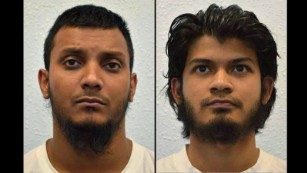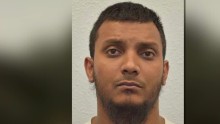British police tricked terror suspect into handing over phone, source says
British police mounted an elaborate undercover operation to seize a terror suspect's cellphone before it could lock and potentially become inaccessible, a source close to the investigation told CNN on Friday.
A goldmine of information retrieved from the phone, including communications with a British ISIS operative in Syria, played a key role in securing a conviction against Junead Khan.
The 25-year-old delivery driver, accused of plotting to kill U.S. airmen at the RAF Lakenheath air base in eastern England, was convicted Friday by a British court of preparing terrorist acts, according to the British Crown Prosecution Service.
British investigators feared that if Khan's iPhone 5S had become locked it would be very difficult to retrieve data, the source told CNN. Their quick action also helped avoid problems faced by the FBI after the San Bernardino, California, shootings in December.
The FBI was unable to gain access to gunman Syed Farook's locked iPhone 5C for almost four months. On Monday the Department of Justice announced the FBI had finally obtained access to data on the phone after an unidentified third party provided help. The FBI and Apple had been engaged in legal proceedings after U.S. authorities attempted to compel Apple to provide a technological solution to unlock the phone.
Police officers posed a company managers
Khan was arrested in mid-July 2015. Undercover police officers posing as company managers arrived at his workplace and asked to check his driver and work records, according to the source. When they disputed where he was on a particular day, he got out his iPhone and showed them the record of his work.

Junead Khan, left, and Shazib Kahn plotted to join ISIS, prosecutors say.
The undercover officers asked to see his iPhone and Khan handed it over. After that, he was arrested. British police had 30 seconds to change the password settings to keep the phone open.
"It was very important we actually took possession of that phone ... a lot of evidence presented at court was held on that phone," Dean Haydon, the head of Counter Terrorism Command of the British Metropolitan Police, told CNN.
Haydon told CNN Khan had used his phone to keep in contact with ISIS fighters.
Phone showed contacts with ISIS
"Via that phone we knew that they'd been in contact with Daesh fighters in Syria via text message, via emails but also using social media applications but also there was a vast amount of extremist and terrorist material on there in relation to how to make a bomb, for instance, but also material that related to atrocities overseas," he said.
One of the ISIS fighters was known to Khan as 'Abu Hussain,' strongly suspected of being former British hacker Junaid Hussain, who was later killed by a U.S. drone strike in Syria in August 2015.
Hussain had offered to share contact details of British soldiers with Khan, but Khan told Hussain he wanted to attack Americans. At trial it was alleged the two had communicated using the encryption app Surespot.
Khan planned to kill U.S. airman
Khan planned to stage a car crash near a U.S. or Royal Air Force military base, then attack a U.S. airman with a knife, Haydon said.
"He'd also researched and planned on how to make a pressure cooker bomb," Haydon said. "We think that that bomb was going to be detonated if he was compromised by police either before or during the actual attack."
The court also convicted Khan and his 23-year-old uncle, Shazib Khan, both from Luton, northwest of London, of preparing to travel to Syria to join ISIS.
UK police preparing for 'enormous' potential ISIS attacks, British terror chief says
According to prosecutors, the two men plotted to join ISIS between August 2014 and July 2015. Junead Khan, however, changed his mind and shifted to planning terrorist acts in Great Britain.
Men videotaped locations in London
At one point, the men drove around London videotaping locations such as the Prime Minister's residence, Parliament and London's main war memorial for a video titled "ISIS drives around Westminster."
When police searched their home, they found a leaflet titled "Terrorists or terrorised," a book titled "Guide to the Islamic State" and ISIS flags, prosecutors said.
The convictions come less than two weeks after a London court convicted four men in an ISIS-inspired plot to kill service members on the streets of London,according to prosecutors.
In 2013, two men hacked British soldier Lee Rigby to death after hitting him with a car on a London street. They said the killing was "an eye for an eye, a tooth for a tooth" in retribution for the killing of Muslims.
News Courtesy: www.cnn.com











